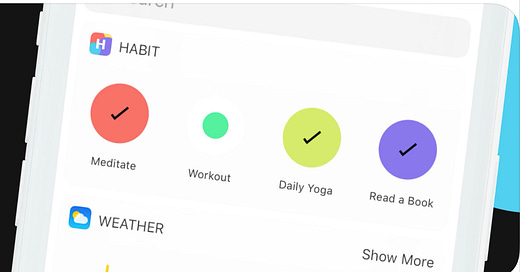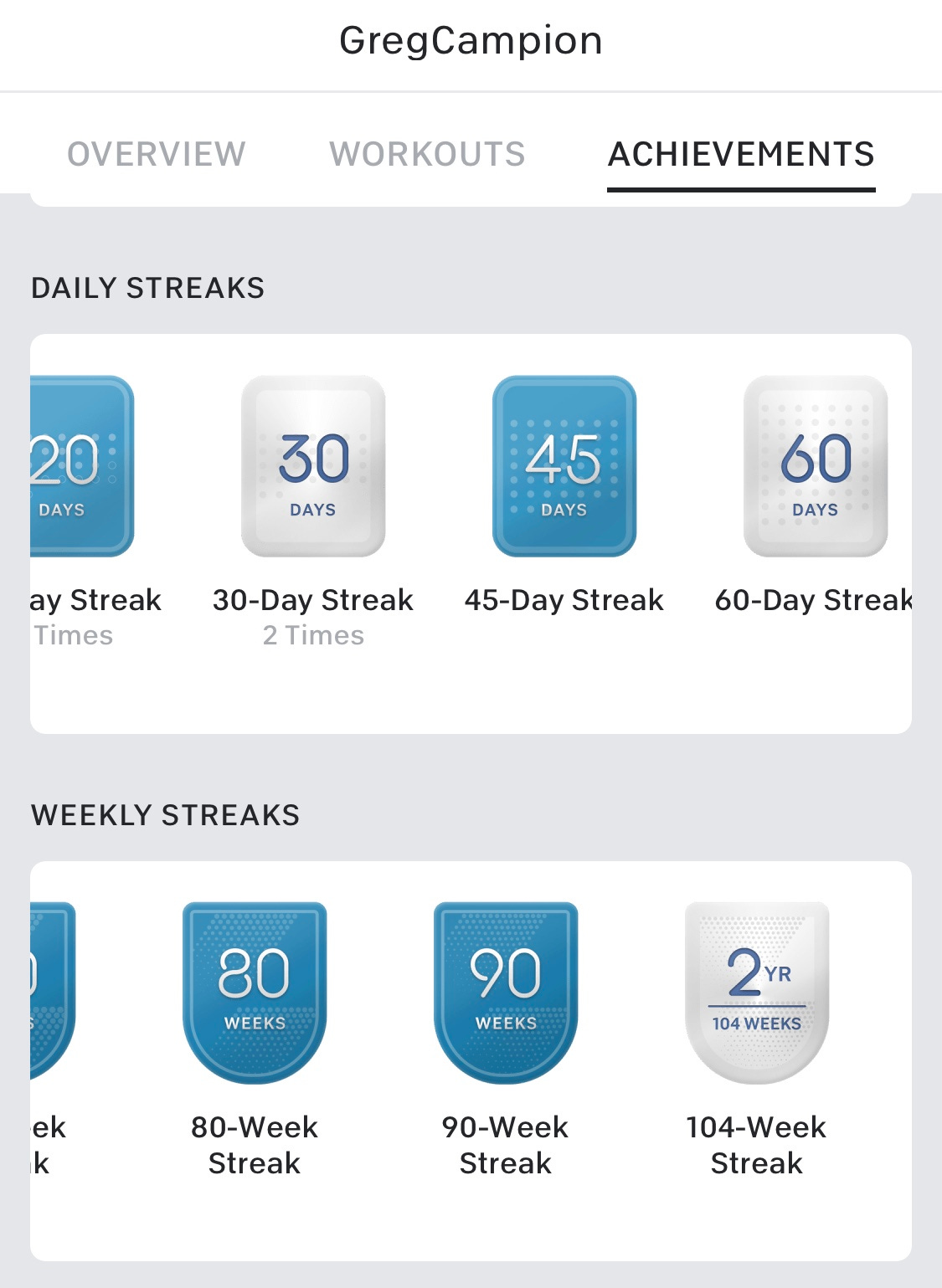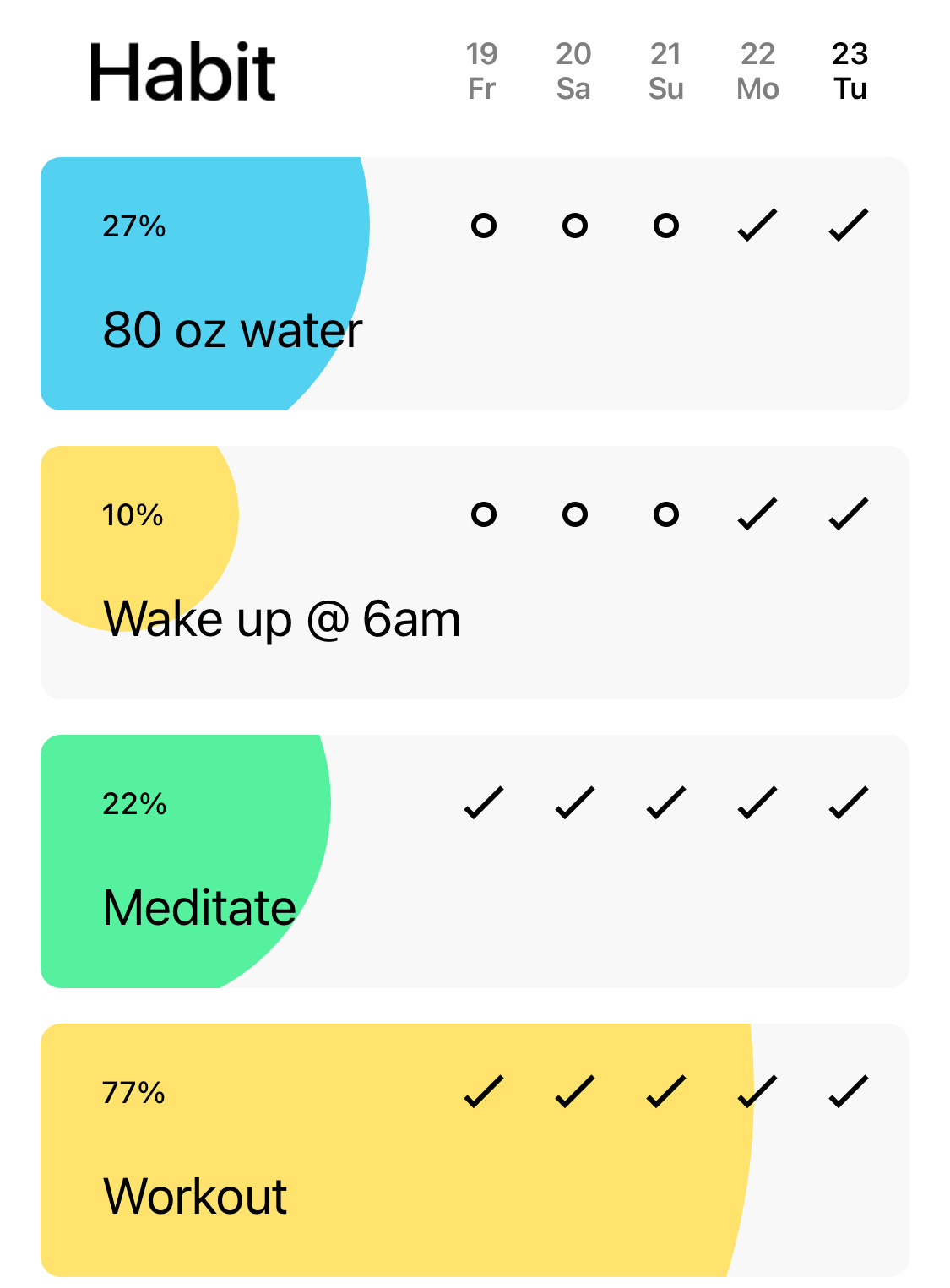There is a powerful psychological force that influences our behavior in many ways—known and unknown—from our finances to our fitness, and that is the concept of a streak.
What comes to mind when you think of a streak? Is it the gambler who just can't lose on the craps table? Or maybe the 'hot' baseball team that just rattled off ten wins in a row? Or is it the stock (or these days, more likely the cryptocurrency) that's gone vertical for five straight days?
The reality is that streaks are everywhere.
Grammarly, the online version of your 6th grade English teacher, knows a thing or two about streaks. This was in the email they sent me yesterday. That's right, a 49-week writing streak. Beat that!
Headspace, the meditation app, is also in the business of surfacing streaks. I'm five days into being quiet at the moment… even if many people in my life would beg to differ. (By the way, I'm back to Headspace after brief flirtations with Calm and WakingUp — here's my intro to meditation if you missed it).
And how can I not mention Peloton? They might be the reigning champs of streaks. Every time I get on a ride, I'm nudged to dole out a few virtual high-fives to fellow riders hitting their own 10- or 30-day streaks. At this point, I've gotten enough badges to qualify as a 5-star General. Of course, I did do 483 days of Peloton in a row... Am I bragging? Clearly!
So what are all of these streaks good for? Well, based on the content of this article so far, I guess we can say that 'bolstering the ego' is one purpose. And it's true. Seeing these checkmarks and badges and smiley faces does give us an endorphin rush—and it makes us feel good about ourselves—no matter how sophisticated we think we are. (Spoiler alert: We’re about as sophisticated (and predictable) as Pavlov’s dogs when it comes to our behavioral responses to rewards—even virtual ones).
Keep the streak
Yes, these little rewards and notifications and reminders of our streaks are motivating. They gamify the experience. They get us addicted. And they incentivize us to "keep the streak." That was the mantra I said to myself 483 days in a row. Keep. The. Streak.
These days I'm trying to be less psycho about 'keeping the streak' but I am tracking what I'll call my 'positive' habits on a daily basis. I'm using an app called Habit - Daily Tracker, which I fill out every night. It's basically one consolidated 'streak machine.' It's convenient to have all of these habits in one place to track my progress toward the identities I'm trying to embody. More on that here and here.
Negative streaks
But even such diligent tracking of habits is not, on its own, the key to motivation. In fact, sometimes it can (and does) have the opposite effect. In theory, I don't want to miss two days in a row because that's the start of a new (bad) streak. In reality, I miss two days in a row. Or seven. Or fourteen. But the power of using an app like this is that it does force you to be honest with yourself. What you have and haven’t done is right there in black and white (okay, light blue, yellow, and pastel green). And there is something powerful about seeing that raw, emotionless data. It's harder for us to tell ourselves stories that aren't quite right.
Interestingly, the companies really pushing streaks are generally in the business of helping us to cultivate healthy habits—like writing, meditation, and exercise in the cases of Grammarly, Headspace, and Peloton, respectively.
But what about those not-so-healthy habits?
Netflix doesn't remind you that you're on a 365-day binge streak.
Budweiser isn't giving you a punchcard for how many days in a row you've knocked back a cold one.
And while Starbucks likes to give you stars, rewards, and a free coffee on your birthday, they're not going out of their way to mention that you're on a 5-day streak of consuming six-dollar Honey Oatmilk Lattes.
Indeed, positive streaks are much easier to access and track because they’re served up to us regularly. The negative ones? Not so much. It takes a bit of extra intention and effort for us to track those ones ourselves. But it’s doable.
At the end of the day, streaks can be effective motivational tools. Positive streaks and negative ones, too. All of the companies mentioned in this article have this figured out. And that's why the armies of MBAs tasked with influencing your behavior on behalf of the world’s largest brands have intentionally decided to show (or not show) them to you.
So think about how you can use streaks to your advantage. Sometimes, we can hack our own behavior just by making it a bit more obvious what exactly it is that we're doing (and not doing). And that can be a powerful first step toward change.
That’s it for this week but before you go…
Image credit: Habit - Daily Tracker
Extra credit: A Survey, a Podcast, and a Year Without Drinking
Thank you so much to everyone who answered last week’s 1-minute survey about Intentional Wisdom. But I want to hear from more of you. So here’s the link again in case you missed it:
And the survey asks about whether or not you’d want an Intentional Wisdom podcast. I haven’t decided yet if I’m going to do this or not, but I did make a sample episode so you can hear what that would be like. Check it out below.
Finally… if you want to read about my year-long streak of not drinking, you can do so here. TL;DR - Good for the body, bad for the social life.
That’s it. Have a great week!
Greg










I'm working on building good habits and gamifying it could help me keep my streak going.
Great article. I learned the importance of streaks and gamifying projects in my personal life, and it’s shocking how much more I get done and how much more I enjoy it too.